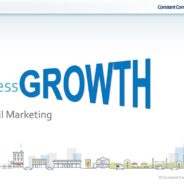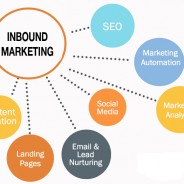Posted by admin on 12-12-20 in Blog | Comments Off on Use Constant Contact to Drive More Business
When it comes to helping you to build your brand, reach new audiences, and drive more business—you’ve got to think big. That’s why Constant Contact is more than just email marketing. Use our free intelligent Website Builder to create and publish a professional website in just minutes. Step up your clients’social media presence with Facebook and Instagram Ads that generate awareness and drive new leads, or use Google Ads to drive more traffic to their website. Drive results and keep their audience engaged with Email Marketing Automation, and convert website visitors into customers with Lead-generation Landing Pages. Plus, you’ll get powerful ecommerce tools like abandoned cart reminders to keep your clients’ customers coming back for more.
The best part? You get all the right tools, all in one place with our online marketing platform. Call or eMail right now to learn more.
Posted by admin on 1-01-16 in Blog | Comments Off on Inbound Content Marketing
Content marketing has become a “jungle.” There is so much content out there and it has become so time-consuming to create and then promote it. A lot of businesses, in fact, have ditched their inbound content marketing programs and have gone back to strictly outbound programs. They have decided to pay for advertising that just promotes their products and services. This is a huge mistake for several reasons. But probably the most important reason is that today’s consumers no longer respond very well to a “hard sell.” Instead, these “new” consumers are looking for information, for a relationship with a brand, and for a level of trust that influences them to buy. And research shows that price is less a factor than trust.
Nicole Boyer
Posted by admin on 11-11-15 in Blog | Comments Off on Holiday Marketing Guide 101
 Get this Guide and drive real results for your business this holiday season.
Get this Guide and drive real results for your business this holiday season.
If the Holidays are an important time for your small business, there’s a good chance holiday planning is already on your mind.
While you may not have all your plans finalized, or even started, you know that the next couple of months are going to go fast and the season will be here before you know it.
In the Holiday Marketing Guide, you’ll learn the tried and true strategies for planning your holiday marketing.
Download the Guide
Posted by admin on 7-07-15 in Blog | Comments Off on Why Content Goes Viral
Every day, countless new articles, videos and blogs are uploaded to the Internet. Most of these languish in relative obscurity. But a few go viral: they explode across the web, attracting the attention of hundreds of thousands (sometimes millions) of people in short order. Content that goes viral may remain in the public consciousness for days, weeks, or longer. So for those who want to reach a large audience—whether it’s for a corporate marketing campaign or to promote a personal cause or to show the world your cat’s amazing yodeling ability—the question of what makes content go viral online important.
In our research, two of us (Milkman and Berger) have explored what it is that makes some content spread like wildfire and whether it’s possible to deliberately achieve viral status. If so, what are the characteristics of viral content?
Our work builds on previous research exploring questions about which urban legends catch on and why? And what drives the spread of gossip?
We examined what content on the New York Times’ homepage is most widely shared, and what scientific research summaries are most likely to be passed along and found that viral content tends to be characterized by certain, predictable qualities. While content may be shared for many reasons, overall, content that elicits an emotional reaction tends to be more widely shared. In addition, stories stimulating positive emotions are more widely shared than those eliciting negative feelings, and content that produces greater emotional arousal (making your heart race) is more likely to go viral. This means that content that makes readers or viewers feel a positive emotion like awe or wonder is more likely to take off online than content that makes people feel sad or angry, though causing some emotion is far better than inspiring none at all. Also, anger-inducing content is more likely to be shared than sadness-inducing content because it produces greater emotional arousal or activation.
What our findings mean for practical purposes is that if you’re trying to create content that will make a big splash, making the message positive is likely to help, and emotionality is key. Of course, more interesting, practically useful and surprising content is also more likely to go viral.
The take-away message from this work is that if you want your video, press release, news story, blog post or tweet to reach as many people as possible, there are specific things you can do to increase its chances of being widely shared. Make it emotional—ideally triggering emotions like anger, anxiety or awe that tend to make our hearts race; and if you can, make it positive. This may be more even effective than other methods that are currently in wide use like targeting “influentials,” or opinion leaders. Crafting contagious content, as this research suggests, may provide more bang for your buck and create more reliably viral content.
Published in Scientific American
By Liz Rees-Jones, Katherine L. Milkman and Jonah Berger
Read the Complete Article: Click Here
Posted by Skyking on 5-05-15 in Blog | Comments Off on USPS: Postcard Use Is Up Among Direct Marketers
Consumers may notice they’re getting fewer postcards from friends, but USPS says direct marketers are still fans of the mail option. Specifically citing a product called “Every Door Direct Mail,” USPS says that what it first issued as “postal cards” in 1873 are still distributed in the billions each year.
“Since the EDDM service was launched in 2011, USPS has handled about 1.2 million transactions, resulting in over 6.4 [billion] pieces of mail and more than…$1.2 billion in revenue,” USPS tells Target Marketing. “We are seeing growth in this type of mail. These are mostly oversized marketing/business postcards.”
You define the specific demographics for delivery. Choose among postal routes based on your marketing plan to reach the potential customers near your business who matter most. Focus on up to a 5-mile radius of your business or search for routes by city and state or ZIP Code™. You can use demographic data including age range and average household income and size to choose among routes.
There’s no need to purchase mailing lists, and with Every Door Direct Mail service, you reach potential customers for as low as 17.5¢ per mailpiece.
For EDDM, the most popular sizes are postcards (6.5″ x 9″) and oversized postcards (8.5″ x 11″), and then an EDDM option that isn’t a postcard at all — it’s a tri-fold menu (4.25″ x 14″).
Two reasons that make EDDM useful in marketing are that the tactile postcard can be perceived as more personal and it is easier to put on the fridge. Both are a plus for marketing messages. Plus it can contain coupons or other offers.
Direct mail-specific postcard tips:
- Have a purpose for the campaign
- “Be sure to include high-quality photos or other striking images, graphics and colors.”
- Keep copy short.
- Make headline meanings clear.
- Use postcards to gain leads, not close sales.
- Include contact information, such as phone numbers, email addresses, etc.
- Be timely — even include a deadline for the recipient.
- Include an offer.
- “Think multi-faceted. Postcards can be used for many purposes, including reminders, gift certificates, coupons, new product announcements, openings, discounts and even as tickets.”
- Opt for high-quality (from the card to images).
- Oversized cards stand out in the mail. So do uniquely shaped ones.
Posted by Skyking on 4-04-15 in Blog | Comments Off on What are the benefits of Inbound Marketing ?
Many of today’s traditional marketers still use outbound marketing to reach their audiences. For message distribution, they use print media, radio, and TV advertisements. For lead generation, they use direct mail, cold calls, and email blasts. While these methods may have worked great in the past, by using tools like TIVO/DVR, email spam-blockers, and caller ID, consumers now can easily block messages they don’t want. Today people are in more control over how they consume media and what messages they care to hear.
Consumers still want to learn about the best products and services for their needs.
It‘s just that these days, they want to find this information on their own, most often by using the internet to conduct research and make better educated decisions about their purchases. For example, someone might peruse the blogosphere to find out about others‘ first-hand experiences with a particular product or service. Maybe that person will also search for reviews online or engage with others in social media to learn about other views and opinions.
Google is the new yellow pages.
This changing nature of consumers‘ shopping habits means that instead of continuing to push marketing messages out, effective marketers must adapt to consumers‘ new behavior by creating marketing campaigns that pull people in to their business. This strategy is called inbound marketing. Sometimes referred to now as relationship marketing.
Inbound marketers offer useful information, tools, and resources to attract people to their business and its website, while also interacting and developing relationships with consumers on the web. The three key inbound marketing tools are blogging and content creation, search engine optimization, and social media marketing.

The Constant Contact Toolkit is one of the most powerful applications for marketing your business using social media.
Get a FREE 60 day trial by CLICKING HERE.
Posted by admin on 3-03-15 in Blog | Comments Off on 15 Pinterest for Business Best Practices
1. Promote through other channels
The fastest way to jumpstart your Pinterest presence is by promoting it through other platforms. Add the Pinterest follow button to your website. Promote your presence on Pinterest through your other social networks, such as Facebook, LinkedIn, Google+, and Twitter. Consider launching a Pinterest contest and write a blog post to promote it.
2. Make the best board on a specific topic
By taking this approach, you increase the chances of your board attracting followers who are passionate about a specific topic. Create resourceful boards based on a few core keywords that you already use in your SEO strategy. Committing to create the best board on a topic means being
ready to promote other users’ pins to enhance your collection.
3. ENGAGE WITH OTHER’S PINS
Start following users you think would want to follow you back. Like and comment on their pins. When someone sees you interacting with his or her
content, they might check out your account and choose to follow you.
4. AVOID HUMAN FACES IN VISUALS
Data shows that Images with no human faces are shared 23% more than those with them. While having some boards featuring human faces can be valuable, try to use a variety of photos and illustrations.
5. BE PICKY WITH YOUR COLOR CHOICES
Data also shows that images with dominant colors (such as red, dark green, pink) are shared 3X more than images that don’t contain them. In addition, red or orange images are repinned twice as often. When selecting visuals for this network, choose wisely!
6. CREATE A USER-GENERATED BOARD
By enabling other users to contribute their own pins to your pinboards, you open up a great opportunity to involve fans and customers in your marketing. Pick out a few of your top evangelists or customers and create a board dedicated to their pins.
7. HIGHLIGHT YOUR CUSTOMERS
Promoting your happy customers is a great way to create a positive sentiment around your brand. Encourage your customers to send
you photos (or take photos of them at your next event). Create a board
of their smiling faces – perhaps using your product or service!
8. PROMOTE YOUR BLOG CONTENT
Start using clear, beautiful images that could be successful on Pinterest in your blog articles. You should be using images in your blog articles anyway! Pin visuals that best highlight your written content.
9. HOST A CONTEST
Some brands have already started launchingcontests using Pinterest. Hold a contest that asks users to create a pinboard on their own account to demonstrate what they love about your brand, products, or services. Ask them to send you a link to their pinboard so you can evaluate entrants, and the coolest board wins a prize!
10. ADD Pin It BUTTONS TO YOUR WEBSITE
Make it super easy for website visitors to share your visual content or images on Pinterest by adding a Pin It button to your site. Just like other social media sharing buttons, this will help to expose your brand to a new audience.
11. ADD LINKS IN PIN DESCRIPTIONS
Whenever possible, include links back to your website and landing pages in your pin descriptions to drive traffic back to your website. Keep track of referral traffic and leads generated from Pinterest. Such insights will inform you about how useful this platform is in comparison to your other efforts.
12. BUILD A VIDEO GALLERY
Pinners aren’t only limited to pinning images; they can pin videos, too! Create a pinboard of some of the interesting videos your business produces interspersed with relevant images.
13. USE HASHTAGS
Users can use hashtags to tag their pins and make their content more search-friendly. Promoting a new campaign of some sort? Create a pinboard around it, and tag it with a hashtag you’re also using on Twitter and Facebook to leverage an integrated, crosschannel campaign.
14. FEATURE OFF-LINE EVENTS
Create a pinboard that features the best photos or video footage of any events you host to help you generate buzz and promote the next one. For instance, at HubSpot we have created an “INBOUND Conference” board that features a lot of pictures from the conference that we host annually.
15. EMBED POSTS ON YOUR WEBSITE
Pinterest allows you to embed posts on your website easily. This can help expose the visibility of your Pinterest content through other channels. We even wrote a blog post here that teaches you how to do this step-by-step.
Posted by Skyking on 2-02-15 in Blog | Comments Off on Content is King on Webstes & Blogging

In my last post I mentioned that topping the list of well-known factors used by Google to search and rank websites are:
• Type of content (how relevant the data on the site is to the search terms)
• Quality of content (spell check is used to separate professional sites from amateur wannabes)
• Freshness of content (sites from 1996 are less likely to be returned before sites from 2014)
So it is only common sense that the content of your website is a major factor in successful SEO. In an August 2014 survey by Ascend2, 41% of respondents said that the creation of content is the most challenging obstacle to reaching the next level of Inbound Marketing success.
In the same survey, when asked “What are the most effective tactics used for Inbound Marketing purposes?” 59% said Marketing Content creation. While a close second was Search engine Optimization (SEO) at 54%.
So content creation is both the most important and effective factor in Inbound Marketing, plus the most difficult to produce.
Many marketing professionals are now including the term Content Marketing as a description for Inbound Marketing.
What is online marketing Content?
It is any type of text or video and other media used to inform and entice customers to buy. The objective is to engage visitors with messages and content that create attention.
In addition to your standard site content, such as your home page, the most successful use of content is to give the viewer interesting and useful information that they will find to be engaging and hopefully share with others through social media. This generally should not be about selling your product or service.
One of the quickest and most effective ways to create remarkable and informative content is through Blogging. It is important that your website has a blog. Companies that have a blog enjoy 97% more inbound links and have 43% more indexed pages and have far greater leads than those that do not Blog.
Business websites that Blog have 55% more website visitors and 70% more leads. So let’s take a closer look at blogging as a method of content creation.
Blogging for business is not as difficult as you may think it is. There are several reasons to Blog.
First, and most important, it is the easiest way to keep fresh content on your website. Google and the search engines love new content. It shows them your site is current and active. Most business sites have the same content from when they were first launched years ago. A website that has not changed since 2001 is not good in the eyes of search engines, and will be ranked accordingly.
In other words, regular business blogging helps you rank in search engines and get found when people search for industry-specific products or services. Thus the blog enables you to attract organic traffic and familiarize people with your business. This is also critical to the SEO of your website. The more blog posts you publish, the more indexed pages you create for search engines to display in their results.
Blogging also helps you to:
• Build your brand
• Establish yourself as an authority in your industry
• Connect directly with customers and potential clients
• Provide value to your business and customer community
A Blog is not the only text specific content you can make available on your website. Longer-form content items like e-books, whitepapers, or research reports are also powerful ways to help more of the right people discover you online. Plus they offer the opportunity to capture prospect information if the content is linked to a downloaded application.
Finally, it is critical that your blog page is on your website, and not on a stand-alone blog service.
Posted by Skyking on 11-11-14 in Blog | Comments Off on What Is Your Image?
WHAT IS YOUR IMAGE – Before diving into social media for your business or organization, you should decide what kind of image you want to portray through your various social media outlets.
Some argue that social media should be free and easy going, and marketers should take a casual approach. Others disagree and think users should maintain a more serious, buttoneddowned approach. The path you follow is up to you and your business or organization’s culture and personality. Either way, be sure to stay consistent with the brand identity you’ve established.
No matter which way you fall on the casual versus serious choice, make sure your posts sound human. After all, you’re connecting with other human beings. Social media marketing gives you a unique opportunity to humanize your brand and to show your customers, members, or prospects that there are real people behind the product or service — people just like them. Use a conversational tone and forget the professional jargon and marketing talk.
This helps people relate to your business or organization, and that goes a long way toward getting people to know, like, and trust you. When people know, like, and trust you, they are much more likely to share your message with their friends. And it’s word-of-mouth (i.e.: the network effect) that makes social media marketing such a powerful marketing strategy. Remember, social media is people sharing with people.
Additionally, you’ll want to portray yourself accurately in your social media profiles. If you’re using the company logo as your avatar, make sure it’s the most up-to-date version.
If you’re using a photo of yourself, try using one that is no more than 18 months old. Chances are good you’ll meet some of your social media followers and fans in real life, so you’ll want them to be able to recognize you.
Know Who You and Your Company Are and Portray Yourself Consistently
Posted by Skyking on 9-09-14 in Blog | Comments Off on Best practices for social media marketing success
In the evolving world of social media marketing, it can be hard for a time-starved small business or organization to keep pace and know what to do when it comes to connecting with customers and members on sites like Facebook, Twitter, LinkedIn, Foursquare, and Yelp.
While there’s no “one-size fits all” approach, I’ve assembled the best practices for social media marketing success that will help your business or organization, whether you’re just getting started or trying to take your efforts to the next level. We will share these practices over the next few weeks.
1. Have a Goal
Like most marketing and business efforts, it’s good to have a goal in mind as you delve into social media marketing. It doesn’t have to be anything audacious like increase sales 30% year over year. Something more along the lines of improving company/brand awareness; adding a new channel to interact with customers, members, donors, and prospects; or improving search engine optimization (SEO) will work just fine.
It’s important to keep in mind that the return on investment with social media marketing cannot always be measured in hard dollars. While one can offer deals and make sales, the real power of social media marketing is in building relationships and remaining top of mind with existing customers. Plus, the viral nature of social media can help you find and connect with new customers.
A July 2010 study by Gartner found that 74% of consumers rely on some type of social media network to guide purchasing decisions. That’s because people rely on what others have to say about a product or brand before making an investment themselves. The survey points out that marketers should use social media networks to target the people who influence others’ purchasing decisions. Doing so may not have a direct ROI attached to it, but it can indirectly help influence sales.
If you’re new to social media, set achievable goals that will allow you to get your feet wet and start building connections with your existing customer base. As your comfort level and social media savvy grow, so too can your goals.
NOTE: 87% of business today are using Social Media. 74% of Buyers rely on social networks to guide purchasing decisions. 55% Share purchases on Social Networks. 68% Learn more about a charity if they see a friend posting about it.












